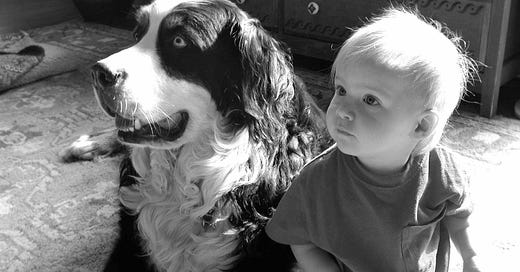I was 35 when Connor was born, and I’d already felt like I’d lived several different lifetimes – as a single person, a private investigator, and then a film producer living alone in an old Spanish-style Hollywood apartment. Then I hired Ed on a production, fell in love and got married, and work and love and life bled together until there were few times when we weren’t plotting screenplays or planning film shoots or entertaining also-childless friends.
Parenthood was an active choice for us, and just as we deliberated the timing of pregnancy, we also read, discussed, and prepared to be the kind of parents we wanted to be. The conversations began with observations about the families we knew – what did we love, what did we wince at, what made sense, and what felt like it didn’t fit? We ran the same analysis on the parenting books we read – for example, sleep training didn’t feel like a match for our style, but co-sleeping fit into place with a sold thunk.
Part of that preparation was deciding how we would address the idea of family rules. We wanted to be aligned from the beginning, clear about expectations so we weren’t just inventing rules on the fly, because most of parenting is making things up as you go along and we hoped to give this a bit more thought. We’re both writers who believe that whole realities can be created with language. Rules and laws are just ideas that have been put into specific language for others to follow. Sometimes those rules are built on a platform of morality, sometimes justice, and sometimes oppression, but rules are usually constructed with a view toward workability. Road traffic follows patterns that work, just as rules about not killing each other or stealing from each other make societies work. We notice when the small, unspoken rules about how to push your cart around a grocery store without blocking aisles get broken, because it interrupts the workability of shopping, and we’re often upset when our own unspoken rules about who takes out the trash or who does the cooking aren’t followed by our partners or family. So Ed and I resolved to create really simple two-word rules as a foundation for our kids, to speak them out loud, and to make them positive affirmations rather than a list of “don’ts.”
Our family rules became:
1. Be Respectful
2. Be Truthful
3. Be Kind
Later, when Connor was maybe five or six and Logan was just a baby, Connor added another rule that might just be my favorite one:
4. Be Generous
It has been surprisingly easy to relate every explanation and correction of unworkable behavior back to those rules. Leaving your toys all over the house isn’t respectful of the rest of the family. Hitting your brother isn’t respectful or kind, and lying about who started it breaks the rule about truthfulness. Keeping the language positive has also created an open door to making a better choice, rather than trying to “fix” a poor choice. It’s a subtle thing, but it feels so much more attainable and enjoyable to strive to be kind than it feels to just not be a jerk.
Language is far more powerful than we give it credit for being, and the words we choose to create and define everything from laws to our mood can have a real impact. Something as simple as shifting “I am sick” to “I feel sick” can change a negative truth to a temporary condition with the possibility of recovery, and the worst language offender, “I am stupid,” changed to “I did a dumb thing,” can shift an identity to a redeemable action.
If you ask our nearly grown children what our family rules are, they can recite them without hesitation, despite not having heard them in relation to behavior in years. I’m proud of those rules and the thoughtful way we created and implemented them, and I hope the tradition of simple positivity carries into our children’s families someday too.




